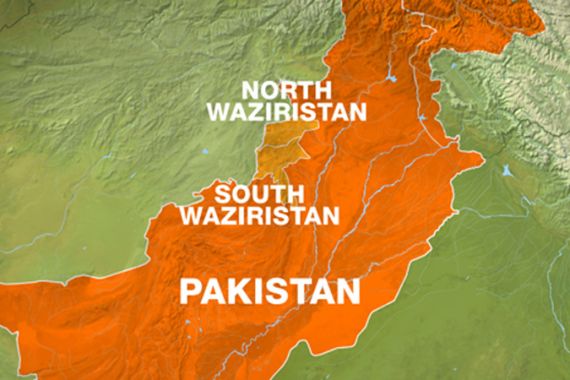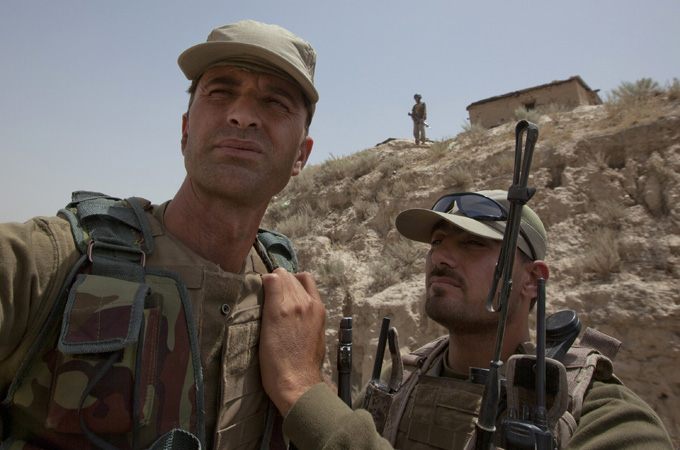Fighters kill several soldiers in Pakistan
Local intelligence officials say raid targeted military checkpoint on the border between North and South Waziristan.

 |
| Violence in the Pakistan-Afghanistan border region has been on the rise over the past weeks [Reuters] |
About 150 heavily armed fighters have attacked a security checkpost in Pakistan’s volatile Waziristan region, reports say.
Armed with rockets, the fighters killed eight soldiers and wounded 12, shortly after midnight, local intelligence officials said on Thursday.
Security forces killed at least 12 fighters in retaliation, they said.
The attack took place in Makeen, an area on the border between North and South Waziristan, which was once a stronghold of Tehrik-e-Taliban Pakistan (TTP), the main alliance of Pakistan’s violent groups involved in suicide and bomb attacks across the country.
Hours later, a bomb went off in a market near the northwestern city of Peshawar, killing four people and wounding three, said hospital officials.
The explosive was planted in rubbish on a roadside, police said.
Tensions continue to rise in the region, with stepped-up missile attacks by US drone aircraft in the tribal region along the Afghan border regarded as a hub of fighters around the world.
Hours before the checkpost attack, a pair of US missiles had hit a vehicle and an alleged fighter training facility near the Afghan border, killing 23 suspected fighters, Pakistani intelligence officials said.
Vehicle targeted
The two missile attacks bring this week’s count to five. The raids occurred within minutes of each other, the officials said, speaking on condition of anonymity.
One missile hit a vehicle carrying five men. The other struck a nearby compound, killing 18 people in the Shawal area, which lies along the border that separates the South and North Waziristan tribal regions.
The compound is believed to have housed a training camp for fighters, the officials said.
|
Former Pakistani military brigadier explains how local authorities were likely involved in the US drone strike that killed senior al-Qaeda figure Ilyas Kashmiri |
Both regions are home to various armed groups, including several involved in attacks on Western forces across the border in Afghanistan.
The area hit was on the North Waziristan side, in territory under the control of Hafiz Gul Bahadur, a regional commander involved in the Afghan unrest.
Pakistan’s army launched a major offensive in South Waziristan in 2009, driving TTP fighters out of their bases in the region.
Many TTP leaders, including its chief Hakimullah Mehsud, were believed to have fled into North Waziristan.
The US has been urging the Pakistani military to launch a ground offensive in North Waziristan, which is also the main base for the Haqqani network that leads the armed campaign just over the border in eastern Afghanistan.
Bin Laden correspondence
The US is tracking possible new targets and stepping up surveillance of operatives previously considered minor al-Qaeda figures, after digging through the mountain of correspondence seized from Osama bin Laden’s hideout, the Associated Press news agency says quoting US officials.
The material is filling in blanks on how al-Qaeda operatives work, think and fit in the organisation, they said.
The new information is the result of five weeks of round-the-clock work by a CIA-led team of data analysts, cyber experts and translators who are nearly finished decrypting and translating years of material, and expect to complete the effort by mid-June, two US officials said.
Al-Qaeda operatives worldwide are feeling the heat, with at least two of them altering their travel plans in recent weeks in apparent alarm that they might become the targets of another US raid, one official said.
The items taken by the SEALs from bin Laden’s second-floor office included a handwritten journal, five computers, 10 hard drives and 110 thumb drives.
Copies of the material have been distributed to agencies from the FBI to the Defence Intelligence Agency to continue long-term analysis, one official said.
The material is now classified, greatly limiting the number of people who can see it and making any detailed public accounting of the contents a crime.
Panetta’s remarks
Co-operating with Pakistan in the fight is essential to maintain pressure on al-Qaeda after Osama bin Laden’s death, Leon Panetta, the CIA chief, said before a US senate hearing on Thursday.
“Continuing co-operation with Pakistan is critical to keep a tremendous amount of pressure on al-Qaeda’s leadership and the networks that provide it support and safe haven at a time when it is most vulnerable,” Panetta said, in written responses to US legislators, a copy of which was obtained by the AFP news agency.
But he said that Pakistan, which is a large recipient of US aid, needed to do more in the fight against terrorism.
“Future requests for security assistance will be informed by Pakistan’s response to the counterterrorism steps we have proposed,” he said.
On Thursday, Pakistan’s army called on the people of the North Waziristan tribal region to turf out all foreign fighters enjoying sanctuary there.
Speaking at a meeting of top military commanders, army chief General Ashfaq Kayani called on the people of North Waziristan “to evict all foreigners from their soil and take charge of their land and destiny once again”.
US-Pakistan differences
Panetta, the current CIA chief, acknowledged that “the relationship with Pakistan is not always easy and we have our differences”.
But he said: “One of the key lessons from this operation is that we have seen no clear evidence to indicate that senior Pakistani leaders were involved in harbouring Osama bin Laden or knew of his whereabouts”.
The al-Qaeda leader and mastermind of the September 11, 2001, attacks was killed by a US commando raid on his Pakistani hideout on May 2, after a decade-long manhunt to find him.
“If confirmed, I will continue to work with our partners in both Afghanistan and Pakistan to achieve our goal of eliminating terrorist networks that threaten the United States and our allies and partners,” Panetta said.
Pakistan has lost up to 11,000 soldiers in its counterterrorism operations in the northwestern tribal areas and has suffered “more than 30,000 civilian casualties in recent years, most recently in significant attacks following the bin Laden operation,” he said.
But he stressed: “It is vital that Pakistan live up to its end of the bargain, co-operating more fully in counterterrorism matters and ceasing to provide sanctuary to Afghan Taliban and other insurgent groups”.